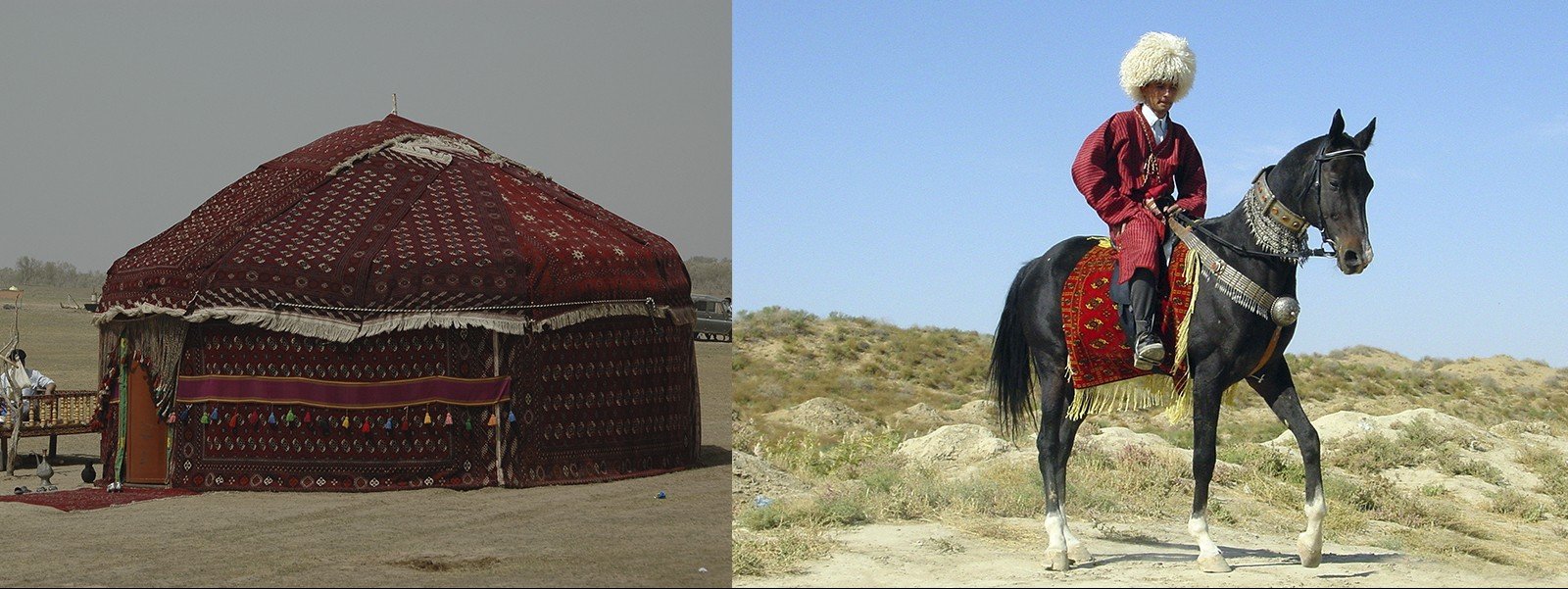
Turkmenistan
Central Asia Tours - Silk Road, Adventure, Mounatineering and Horse rider, Winter Tours in Central Asia 2026
Turkmenistan- is a country in South-Central Asia with a population of about 5 million, and an area of around half a million square kilometers, or almost the size of Spain. Neighboring countries are Iran and Afghanistan to the South and Uzbekistan and Kazakhstan to the North. It is across from Azerbaijan via the Caspian Sea but is otherwise landlocked. Nearly 80% of the country is considered part of the Karakum Desert.
The traditional life of the Turkmen is that of nomadic shepherds, though some have been settled in towns for centuries. The country is known for its fine carpets (one is even featured in its flag) and horses. Turkmenistan is a fairly poor and underdeveloped country, even though billions have been spent on modernization in Ashgabat, Turkmenbashi, and many other cities in post Soviet times. While there has been much construction in Ashgabat, most of the downtown high rises appear empty. And also, the country has extensive oil and gas reserves being developed, with recently opened pipelines to China, Iran, and soon Azerbaijan.
Turkmenistan is a central asian country with Turkic roots. The current government is in firm control of nearly everything. Officially tourism is welcomed, but the requirement for expensive guided tours may discourage visitors. The presence of police and military personnel which will watch your every move and prohibit photographing of even mundane objects, make Turkmenistan the least friendly of the Stans. It is unwise for visitors to discuss politics or the omnipresent police and military. Islam is the biggest religion in Turkmenistan although it remains secular.
The cult of personality the previous president Niyazov created for himself is truly amazing being trully rivaled only by the cult of Kims in North Korea and reminders of the Turkmenbashi's legacy are everywhere.
Turkmenistan's former all-powerful President for Life Saparmurat Niyazov has had a surreal effect on Turkmenistan that will long outlive his presidency. He adopted the title Turkmenbashi ("Father of All Turkmen"), named the city of Turkmenbashi (formerly Krasnovodsk) after himself, and built a 15m tall golden statue that rotated to face the sun in the capital Ashgabat, although it has since been removed. The month of January was renamed Turkmenbashi after himself, while the month of April and the word "bread" became Gurbansoltan Eje, the name of Niyazov's mother. Decrees emanating from Niyazov's palace have banned, among other things, lip synching, long hair, video games, and golden tooth caps. Through it all, Serdar Saparmurat Turkmenbashi the Great (his official title) remained modest: "I'm personally against seeing my pictures and statues in the streets - but it's what the people want", he said. Niyazov's government also spent billions in renovating the country, shut down libraries and hospitals, and even wrote the Ruhnama, a spiritual book to improve the Turkmen people.
Since Niyazov's abrupt if unlamented death in December 2006, his successor Gurbanguly Berdimuhamedov has slowly peeled back the worst excesses of the Turkmenbashi. The Ruhnama has lost its popularity, Berdimuhamedov has continued in the process restoring pensions and old names, while cementing on his own slightly more subdued cult of personality.
One thing of critical importance to any visitors who smoke tobacco! It is (and has been for several years) absolutely forbidden to smoke 'in a public place'. Generally, this means "outside". Smoking at any of the bazaars is a definite no-no, as there were two major bazaar fires in 2006 and 2007. While smoking is generally prohibited in public places, those who smoke tobacco can enjoy these products inside some restaurants, cafes, and nightclubs. They can also purchase snuff from most Bazaars. A good rule of thumb - if you don't see anyone else smoking, you shouldn't.